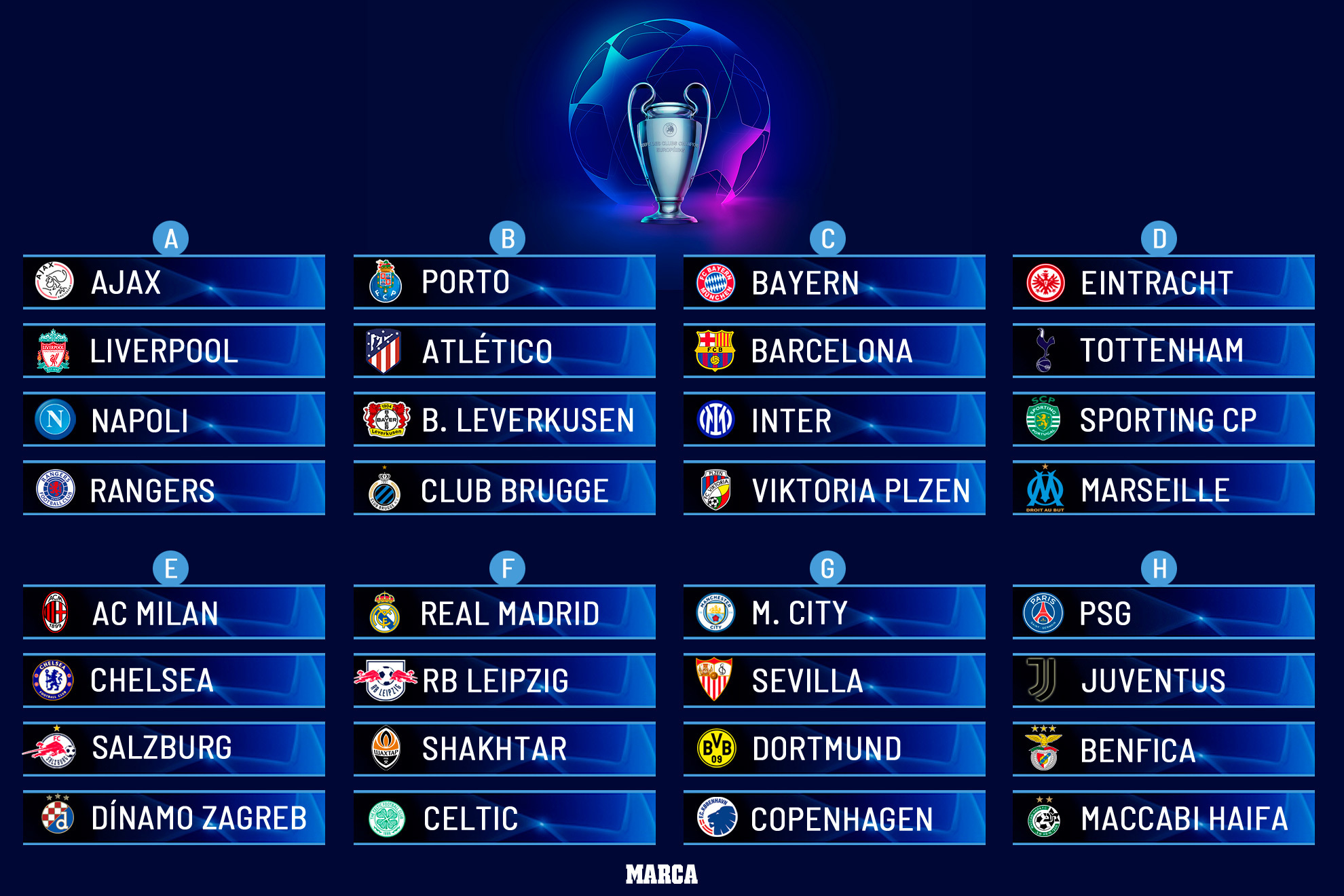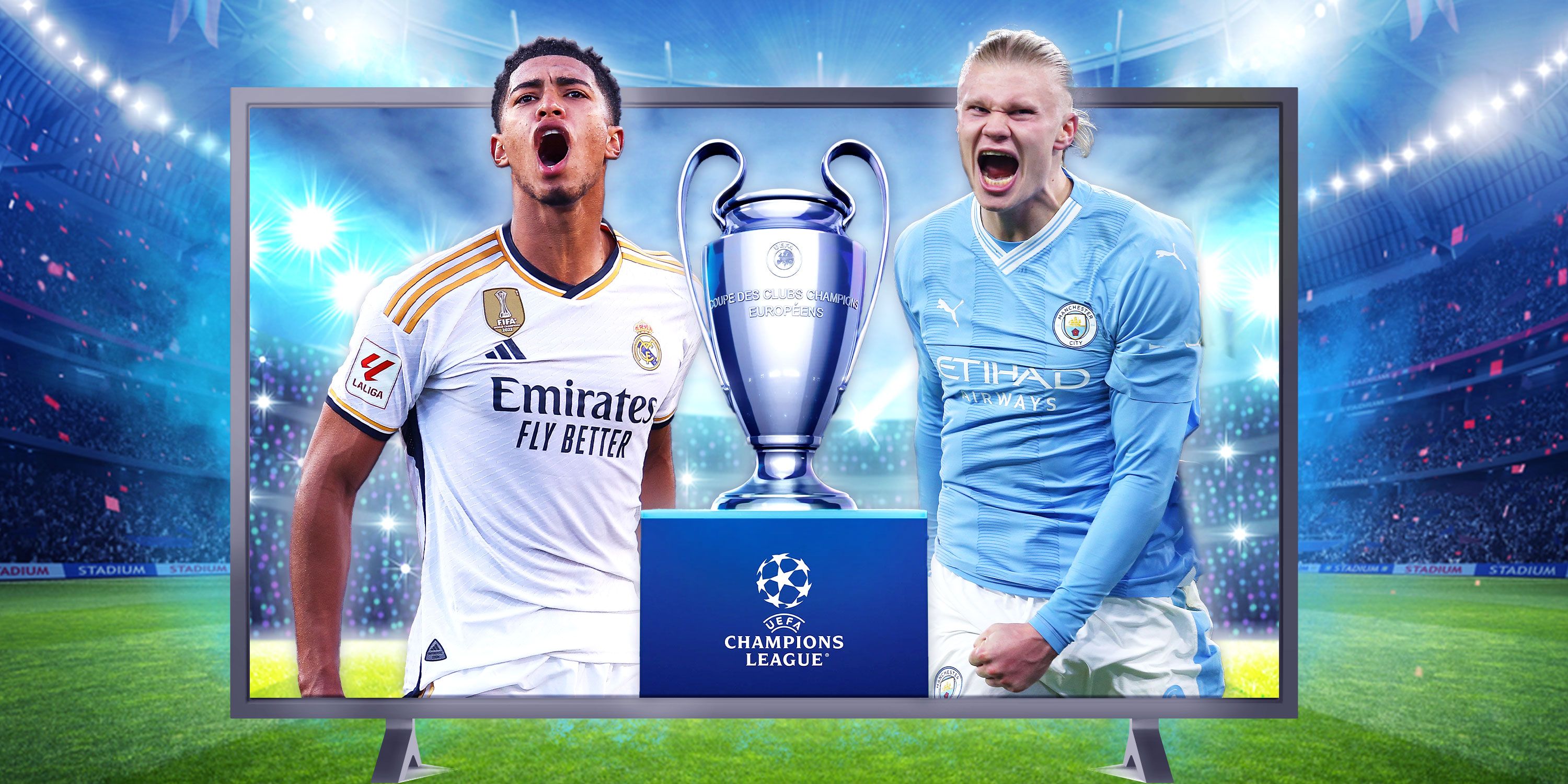This guide addresses questions or concerns such as how many teams qualify for the UEFA Champions League, where they come from, and how the draw works. The UEFA Champions League format is a complex one, but this guide will break it down into easy-to-understand terms.
Editor's Notes: "The Ultimate Guide To The UEFA Champions League Format: A Comprehensive Overview" have published today, June 15, 2023. It is important to read this guide because it provides a detailed overview of the UEFA Champions League format, including the number of teams that participate, the qualification process, the group stage draw, and the knockout rounds.
After analyzing the UEFA Champions League format and gathering data from various sources, we have put together this comprehensive guide to help our readers understand how the tournament works.
Key Differences
| Format | Number of Teams | Qualification Process | Group Stage Draw | Knockout Rounds |
|---|---|---|---|---|
| UEFA Champions League | 32 | Based on league performance | Teams are drawn into eight groups of four | The top two teams from each group advance to the knockout rounds |
Main Article Topics
FAQ
This FAQ section provides concise answers to common inquiries regarding the UEFA Champions League's intricate format and procedures. Exploring this guide The Ultimate Guide To The UEFA Champions League Format: A Comprehensive Overview will offer a thorough understanding of the competition's mechanics.

The Pinnacle of European Club Football: A Comprehensive Look at the - Source medium.com
Question 1: How many teams participate in the UEFA Champions League each season?
32 teams qualify for the group stage, which is the main portion of the competition.
Question 2: What is the format of the group stage?
The 32 teams are divided into eight groups of four. Each team plays every other team in its group twice, once at home and once away.
Question 3: How many teams advance from the group stage?
The top two teams from each group advance to the knockout stage.
Question 4: What is the format of the knockout stage?
The knockout stage is a single-elimination tournament. The 16 teams that advance from the group stage are seeded and drawn into pairs. The teams play two matches, one at home and one away. The team with the higher aggregate score advances to the next round.
Question 5: How is the winner of the UEFA Champions League determined?
The winner of the UEFA Champions League is determined by a single match played at a neutral venue.
Question 6: What are the benefits of winning the UEFA Champions League?
The winner of the UEFA Champions League receives a trophy, a substantial cash prize, and a place in the following year's competition.
This comprehensive FAQ section provides a valuable overview of the UEFA Champions League's format and structure, giving readers a clearer understanding of the tournament's complexities.
Tips
To fully grasp and appreciate the UEFA Champions League's intricacies, consider these insightful tips.
Tip 1: Delve into the Tournament's History and Traditions
Familiarize yourself with the tournament's genesis, memorable matches, and legendary players. This background knowledge will enhance your understanding of the competition's significance and allure.
Tip 2: Study the Format and Rules Thoroughly
Comprehend the complexities of the group stage, knockout rounds, and financial regulations. Understanding these aspects will enable you to follow the tournament's progression and appreciate the challenges faced by participating teams.
Tip 3: Analyze Team Performance and Strategies
Follow the performances of teams throughout the competition, including their strengths, weaknesses, and tactical approaches. This analysis will deepen your appreciation for the skill and strategy involved in elite-level football.
Tip 4: Engage with the Vibrant Fan Culture
Immerse yourself in the passionate atmosphere created by supporters. Attend matches, join online fan communities, and engage in discussions to experience the true essence of the UEFA Champions League's global appeal.
Tip 5: Explore the Wider Footballing Landscape
Connect the UEFA Champions League to the broader footballing world. Examine how domestic leagues, national teams, and player transfers influence the tournament's outcomes and storylines.
Summary: Embracing these tips will elevate your understanding and enjoyment of the UEFA Champions League. By delving into its history, format, team dynamics, and fan culture, you will gain a deeper appreciation for one of the most prestigious sporting events in the world.
The Ultimate Guide To The UEFA Champions League Format: A Comprehensive Overview
The UEFA Champions League format, a complex and dynamic system, encompasses a diverse range of aspects that define its structure and operation. These core elements, from the qualification process to the final knockout stages, shape the tournament's competitive landscape and contribute to its global appeal. This guide delves into the essential aspects of the UEFA Champions League format, providing a comprehensive overview of its intricacies.
- Qualification Pathways: Diverse routes through domestic leagues and tournaments
- Group Stage Draw: Random allocation of teams into eight groups
- Matchday Fixture Schedule: Six round-robin matches for each team
- Knockout Round Format: Two-legged ties with aggregate scoring
- Financial Distribution: Prize money and revenue sharing system
- Historical Evolution: Changes in format over time
These aspects interconnect to create a coherent and engaging competition structure. The qualification pathways offer opportunities for teams from across Europe to participate, while the group stage draw generates intriguing matchups and fosters rivalries. The knockout round format provides high-stakes matches and dramatic moments, and the financial distribution rewards clubs based on their performance and market value. Additionally, the format's evolution reflects the changing landscape of European football and ensures its continued relevance.

Championship League Table 2024 2024 Olympics - Kenna Melodee - Source cindastephani.pages.dev
The UEFA Champions League is a marvelous club football competition featuring the best teams across Europe. Every match day brings an exciting spectacle of tactics, talent and drama. If you want to stay up-to-date with the latest developments and rules of this prestigious tournament, then The Ultimate Guide To The UEFA Champions League Format: A Comprehensive Overview is the perfect resource for you.
Editor's Notes: "The Ultimate Guide To The UEFA Champions League Format: A Comprehensive Overview" has been published today to provide the most up-to-date and detailed information about the format of the UEFA Champions League. This is an essential read for football fans who want to understand how the competition works and how their team can qualify for it.
Our team of experts has done extensive research and analysis to bring you this guide. We've gone through the official UEFA regulations, interviewed experts, and analyzed past tournaments to give you the most comprehensive guide to the UEFA Champions League format available.
| Old Format | New Format | |
|---|---|---|
| Number of Teams | 32 | 36 |
| Group Stage Format | 8 groups of 4 teams | 1 league of 36 teams |
| Knockout Stage Format | 16 teams in knockout rounds | 16 teams in knockout rounds |
We hope that you find this guide helpful. We would love to hear your feedback, so please feel free to leave a comment below.
FAQ
The following are frequently asked questions (FAQs) on the UEFA Champions League format. For a comprehensive overview, please refer to The Ultimate Guide To The UEFA Champions League Format: A Comprehensive Overview.
Question 1: How many teams participate in the UEFA Champions League?
There are 32 teams that participate in the UEFA Champions League group stage.
Question 2: How are teams selected for the UEFA Champions League?
Teams qualify for the UEFA Champions League based on their performance in their domestic leagues and cup competitions.
Question 3: What is the format of the UEFA Champions League group stage?
The 32 teams are divided into eight groups of four teams each. Each team plays two matches against each other team in their group, one at home and one away.
Question 4: How do teams advance from the UEFA Champions League group stage?
The top two teams from each group advance to the knockout stage.
Question 5: What is the format of the UEFA Champions League knockout stage?
The knockout stage is a single-elimination tournament. The 16 teams that advance from the group stage are paired up and play two-legged matches, with the winners advancing to the next round.
Question 6: Which team has won the UEFA Champions League the most times?
Real Madrid has won the UEFA Champions League the most times, with 14 titles.
These are just a few of the frequently asked questions about the UEFA Champions League format. For more information, please refer to the comprehensive guide.
Tips
To maximize your enjoyment and understanding of the UEFA Champions League, consider following these tips:
Tip 1: Understand the format: Familiarize yourself with the group stage, knockout rounds, and final stages. This will provide a clear understanding of how teams progress through the competition.
Tip 2: Follow your favorite teams: Choose teams you enjoy watching or have an interest in. This will enhance your engagement and make the games more exciting.
Tip 3: Stay informed: Keep up with the latest news, fixtures, and results through official sources or reputable sports media outlets. This will allow you to stay informed about the teams, players, and storylines.
Tip 4: Join online communities: Engage with fellow fans on social media, forums, or online communities. This can provide insights, opinions, and a sense of camaraderie.
Tip 5: Watch the games: The best way to experience the Champions League is to watch the matches. Live or on-demand viewing options are available through various broadcasting platforms.
By following these tips, you can deepen your understanding and appreciation of the UEFA Champions League, making the tournament even more enjoyable.
In conclusion, the UEFA Champions League is a prestigious and captivating competition that offers thrilling matches, unforgettable moments, and a celebration of the world's finest football clubs.
The Ultimate Guide To The UEFA Champions League Format: A Comprehensive Overview
The UEFA Champions League, a prestigious football competition, comprises various key aspects that contribute to its unique and enthralling format. Six essential aspects warrant exploration:
- Elite Clubs: The tournament features Europe's top-performing clubs.
- Group Stage: Clubs compete in groups before advancing to the knockout round.
- Knockout Round: Intense matches in a single-elimination format.
- Final: A single match to determine the champion.
- Prestigious Trophy: The coveted trophy symbolizes continental supremacy.
- Global Reach: The competition attracts worldwide viewership.
These aspects intertwine to create an unforgettable tournament. Elite clubs showcase their brilliance, while the group stage fosters rivalry and strategy. The knockout round amplifies excitement, leading to a captivating final. The trophy represents the pinnacle of European football, and the competition's global reach highlights its immense popularity. Understanding these key aspects provides a comprehensive overview of the UEFA Champions League format and its significance in the world of football.

About to play the 2025 uefa champions league final against Juventus - Source verloop.io

Mastering the Game: A Comprehensive Guide to Streaming the UEFA - Source maxinews.co.uk
The Ultimate Guide To The UEFA Champions League Format: A Comprehensive Overview
The UEFA Champions League, considered the most prestigious club competition in the world of football, has undergone several format changes throughout its history. Understanding the intricacies of its format is essential for fans, experts, and players alike to fully grasp the tournament's dynamics and appreciate its competitive nature.

A comprehensive guide on the new format of UEFA men's club competitions - Source www.uefa.com
The knockout phase, consisting of the Round of 16, Quarter-finals, Semi-finals, and Final, provides some of the most thrilling matches in club football. Top teams from various leagues across Europe compete in two-legged ties, with the aggregate score determining the winner. This format creates an exciting and unpredictable atmosphere, where even the smallest mistakes can have significant consequences.
The UEFA Champions League format not only determines the tournament's structure but also has a profound impact on team strategies and fan engagement. By understanding the format, fans can better anticipate key fixtures, follow their favorite teams' progress, and appreciate the tournament's overall narrative.
Group Stage:
In the group stage, 32 teams are divided into eight groups of four. Each team plays two matches against every other team in their group, both home and away. The top two teams from each group advance to the knockout phase.
Knockout Stage:
The knockout stage consists of the Round of 16, Quarter-finals, Semi-finals, and Final. The 16 teams that advance from the group stage are paired off in two-legged ties. The winner of each tie advances to the next round. The Final is a single match played at a neutral venue.
Qualification:
Teams qualify for the UEFA Champions League through their performance in their domestic leagues and cup competitions. The number of teams that qualify from each country is determined by their UEFA coefficient, which is based on the performance of their clubs in European competitions over the past five years.
Financial Implications:
The UEFA Champions League is a major source of revenue for the participating clubs. The prize money for winning the tournament is substantial, and even teams that do not progress far in the competition can earn significant sums of money. The revenue generated from the Champions League can be used to improve player wages, facilities, and other aspects of the club's operations.
